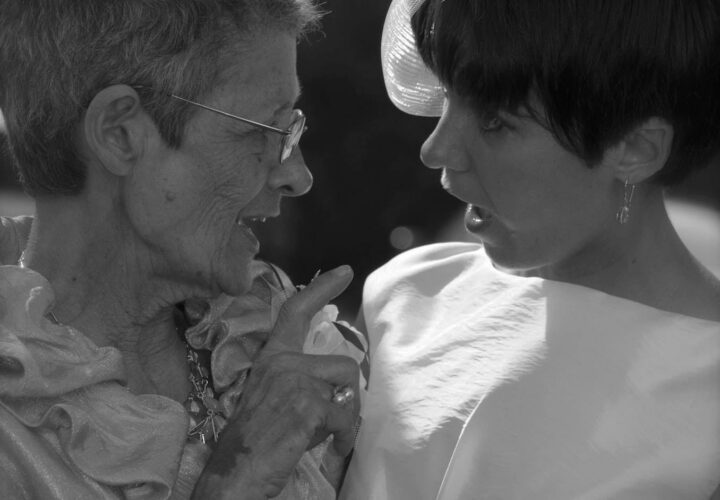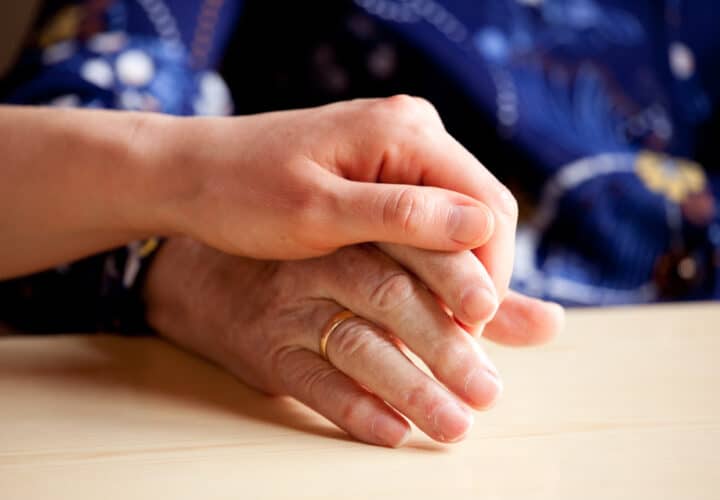When her husband first started experiencing memory problems and behavioral changes at 29 years old, the last thing Katie Brandt would have expected was a diagnosis of frontotemporal degeneration (FTD), a rare form of dementia. Following her husband’s death, Brandt became an advocate for FTD awareness from the caregiver’s perspective, and now serves as the director of caregiver support services and public relations for Massachusetts General Hospital’s Frontotemporal Disorders Unit.
- Frontotemporal Degeneration (FTD) is a form of dementia that causes nerve damage in the frontal lobes of the brain, leading to behavioral or personality changes and trouble understanding or finding the right words
- Two weeks after her husband’s FTD diagnosis, Brandt’s father was diagnosed with Alzheimer’s at 59 years old
Brandt spoke about her experience recognizing changes in her husband, her arduous search for a correct diagnosis and her advice to others on reaching out for both medical services and caregiver support.
Early Signs of Frontotemporal Degeneration Dementia
Being Patient: Let’s start with your husband and what happened before you learned he had dementia. He was extraordinarily young, at age 29, and it’s really hard to associate dementia with someone who is 29 years old. What were some early signs that he may have had dementia?
Katie: Mike and I got married when we were young, we were just 22, and Mike was so brilliant. He had his bachelor’s in theology and his master’s in philosophy, and he became a high school theology teacher. Mike had the ability to translate texts from Hebrew, Greek and Latin. But I remember standing over him one day and we were trying to make a grocery list and he couldn’t spell the words rice or avocado.
He had a small business where he did web design because he was an amazing coder and developed these beautiful pages for his clients. He started getting in trouble because he wasn’t meeting his deadlines and his work just wasn’t that beautiful, high-quality work he used to develop, and he didn’t notice or understand why his clients were unhappy with his product.
Personality Changes and Poor Judgment Associated with FTD
Being Patient: When we talk to people with FTD or who have experience as a caregiver looking after someone with FTD, they often talk about behavioral changes, not necessarily memory. Was that the case with Mike?
Katie Brandt: Everyone knows I am not a doctor, but I’ve worked with a lot of families. So, you want to think of Alzheimer’s disease beginning in the back of the brain in the hippocampus, and that’s where we think about memory. The front of the brain is the part that makes you you, it’s your executive function, it’s your impulse control, it’s things that make you say, “Is it a good idea to spend $5,000 on this boat online?” or, “Should I walk across a semi-frozen lake in the early spring at one in the morning?” which is something that Mike wanted to do.
It’s not that they forget how to do things, and that’s how they get themselves into trouble. They know how to use their credit card online, they know how to drive the car, they know how to get where they’re going, but they’re not making the best decisions about whether or not it is the right time to go to this location, whether they should spend this amount of money or make this comment to someone in public.
Being Patient: What did that look like with Mike? You were obviously the person closest to him, so when did you start to see behavioral changes, and specifically, what were those behavioral changes?
Katie Brandt: Mike was the kind of guy who would come home on a Tuesday night after a day of work and say to me, “I really miss you, let’s have a date tonight.” We were very connected, and after our son was born, it would be a beautiful day in June or July and I’d say, “Let’s go out for the day,” and he would say, “No, you go, I don’t want to go with you.” I mean, it was crazy to think of Mike not wanting to hang out with us.
Mike also developed an odd obsession. Everybody loves Harry Potter, but Mike became obsessed with the Harry Potter audio books. That’s over 117 hours of audio, and Mike wanted to start with the first book and listen all the way through to the seventh without being interrupted. He would listen to it in the car, on Bluetooth in the kitchen, with earbuds in his ears all day and night. It was strange behavior for a man who was 29, but as odd as it was, it didn’t lead me to think of calling his primary care physician because it didn’t seem like a medical issue.
Is It Depression or Dementia? Dealing With Misdiagnoses
Being Patient: What was the turning point for you to go get this checked out?
Katie Brandt: The turning point for us was around safety. Mike was drinking and driving, and that was completely outside of his character. Mike was a huge proponent for being safe and cared so much not only for his own safety and the safety of those he loved, but also the safety of those in the community. So that’s what led us to go to the hospital and to say that something has got to be wrong here.
It was really my mother that kept pushing me to ask the doctor about his brain, and I remember telling her, “Mom, there’s nothing wrong with his brain.” I remember saying that to her, and she was right.
Being Patient: We hear so much confusion from patients and their loved ones about going to the doctors and trying to find answers. What was that like for you?
Katie Brandt: Mike was misdiagnosed by eight different medical and mental health professionals. He spent an overnight in a hospital, had many tests, spent a week in a secure psychiatric facility, and all of those diagnoses came back as some form of depression. Here is where I really want to pause for a moment and highlight all of resources and benefits that I have as an educated, middle-class woman who felt comfortable saying to medical professionals, “I don’t think you’re right,” and going to the next person.
I think we all need to think about the challenges in diagnosis when people don’t have access to resources, high-quality healthcare, and specialists. At the time, we were living just outside of Concord, New Hampshire, and my father was being seen by the director of cognitive neurology at Beth Israel Hospital in Boston, so we were able to bring Mike down after his eight misdiagnoses and the doctor there was able to diagnose him quite easily because at a high-quality, academic medical center they have experience with the rare and unusual.
Getting an Accurate Dementia Diagnosis
Being Patient: You mentioned this before, but access to people who have this depth of knowledge about FTD appears to be quite difficult, is that correct?
Katie Brandt: Of course, it is difficult. One of the things we know is that it can even be difficult for folks to receive an accurate Alzheimer’s disease diagnosis. If it’s difficult to find someone with expertise in Alzheimer’s disease, and then FTD is a rare dementia, what I would say is if your loved one is experiencing cognitive difficulties, changes in behavior and when doctors are talking about their diagnosis and it just isn’t sitting right with you, go to the Association for Frontotemporal Degeneration’s (AFTD) website and look up the members of the medical advisory board. See if there’s anyone close to you or within driving distance. Anyone can call the 1-800 number for AFTD, and ask them, “How can I find a neurologist close to me so that I can bring my loved one to a consultation?”
How to Maintain Hope After an FTD Dementia Diagnosis
Being Patient: What would you say to our audience right now if they have just received a diagnosis of FTD for themselves or their loved ones? What’s the way forward?
Katie Brandt: I would say there is no way forward but together. I would say that we don’t have a cure for FTD today, but we have a cure right this minute for the isolation and loneliness that can come with an FTD diagnosis. There are different ways you can connect: the online communities are so vibrant, and you really can find patient connections, caregiver connections and reach out and find a support group. If you don’t have an FTD-specific support group in your area, try to attend a young onset Alzheimer’s disease support group.
You asked me a little bit ago whether it’s different caring for someone with Alzheimer’s versus FTD, and while I think that some of the technical, behavioral tactics that you’ll use will differ, the services and the support and emotions and the grief that you’ll feel, and even the successes, when you feel like, oh my gosh, we made a trip to the dentist and nobody yelled — those things will be there regardless of a Lewy body, FTD or an Alzheimer’s diagnosis.





I appreciate Katie Brandt’s story. Our daughter, Kara, was diagnosed with bvFTD at 29,Feb 2019. She was misdiagnosed for 1 1/2 years. In 2017 we lost her 16 year old cousin, six weeks later Kara had her first child ,a son, then 3 days later Kara’s grandpa died. We thought Kara was dealing with severe postpartum depression/anxiety. But as time went on, Kara had severe OCD, auditory hallucinations, change in personality and lack of empathy/insight. Kara spent 2 1/2 months in a special Perinatal Psychiatric Unit at UNC Chapel Hill , NC. We live in Illinois. February 2019 we were able to meet Dr. Bradley Boeve ,at Mayo Clinic, RochesterMN who diagnosed Kara.
She lives with us and requires 24 hr care. She is very childlike , very limited verbalization, no executive functioning. Kara is particapating in 2 research studies at Mayo Clinic Alzheimer’s Disease Research Center. I appreciate you for bringing more awareness to this heartbreaking disease.Thank you !